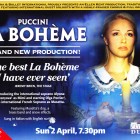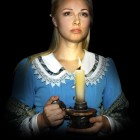Bohème 2017Ellen Kent Productions
Read more about the opera Bohème
The spring 2017 tour by the Ellen Kent organization, presented by Opera and Ballet International, as usual consisted of three works. The repertoire was a popular one, with mainstream Puccini (La bohème) and Verdi (Aïda) both seen frequently in the past. The one rarity, doubly welcome as it has never yet been presented either by the Edinburgh Festival or Scottish Opera, was Verdi's first masterpiece, Nabucco.
Edinburgh got all three, while Dundee, which, in the continued absence of a touring theatre, will miss out on Scottish Opera's new staging in May, just hosted the Puccini. Glasgow saw the two popular hits.
The schedule for the Scottish week was: Mon 27 Mar Glasgow Bohème; Tue 28 Mar Glasgow Aïda; Thu 30 Mar Edinburgh Bohème; Fri 31 Mar Edinburgh Nabucco; Sat 1 Apr Edinburgh Aïda; Sun 2 Apr Dundee Bohème. The OperaScotland reviewers attended the last three of these, the final performances by the group before they headed south to open in Swansea on Thursday.
Venue and setting
The Caird Hall shares one quality with the Edinburgh Playhouse - it is a huge space. It has an excellent, warm, but not over-resonant acoustic, and can give voices an attractive bloom. The stage is large, but with no fly tower or wing space. A good few of the venues the company visits must have similar restrictions, even if they are rather smaller.
A lot of thought had clearly gone in to the general concept of this Bohème staging by Ellen Kent herself, in excellent designs by Nadezhda Shvets. The presentation was visually quite conservative, with a huge traditional backcloth framed by a pair of curtains at each side. Each was painted to represent a view of Paris as it might have been illustrated by Marcello himself. The props were minimal, allowing for quite fast scene changes - two intervals, after Acts 2 and 3. Costumes were later in style than the 1840s setting of Murger's tale - the end of the nineteenth century - but were generally attractive (Musetta's bottle-green velvet outfit in the last act especially so). The men, in shirtsleeves, seemed a touch under-dressed in the freezing attic of the opening scene. While the stallion that had graced the stage in both Verdi works in Edinburgh was now absent, Musetta's lap-dog took an intelligent interest in proceedings without causing any disruption.
Persuasive performance to high standards
The chamber orchestra-sized band, around thirty, under Vasyl Vasylenko, gave an excellent account of the piece, well paced. The Mimì and Rodolfo created convincing characters and both sang well. Indeed Alyona Kistenyova was quite superb, rising to emotional heights in the third act, with a beautifully poised account of Mimì's Farewell 'Donde lieta uscì'. Vitalii Liskovetskyi was equally successful as a puppyish young Rodolfo, gauche and almost innocent.
The other four principals gave thoroughly assured performances in what was altogether a fresh and spontaneous reading of this fine humane masterpiece. If this seemed surprising, it is only because all four of them had played major roles on the two previous Verdi evenings, and must surely have been quite taxed. Iuri Gisca was a warm and touching Marcello, significantly more mature than his flatmates. Vadym Chernihovskiy, by contrast, was a much younger figure as Colline (so often played as a grizzled elder statesman character). His beautifully smooth bass coped handsomely with his song of farewell to his overcoat 'Vecchia zimarra' - though it did look a bit too new to be described accurately as 'vecchia'. Olga Perrier's hugely sympathetic Musetta must have seemed like an excellent performance even for that greater part of the audience, unaware that her previous two evenings had been occupied with the roles of Aïda and Abigaille. Oleksandr Forkushak also did well as a Schaunard whose extrovert play was seen as a mask to cover up his serious view of events.
In all this was an excellent performance of the classic work, greeted with delight by the audience.
2017 promises to be a year of Bohèmes, with Scottish Opera's new production due in May, while the Turin Opera, who first played the piece at its premiere in 1896, will bring it to the Edinburgh Festival. These performers offer them a real challenge. It should be a stimulating summer.






